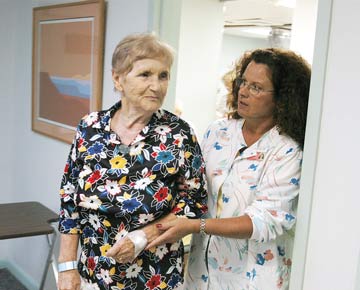Six Surface Disinfection Concepts
The puzzle of superior surface disinfection is never solved....
This website uses cookies. to enhance your browsing experience, serve personalized ads or content, and analyze our traffic. By clicking “Accept & Close”, you consent to our use of cookies. Read our Privacy Policy to learn more.
By: Lee Fleisher
Published: 5/16/2019
With an estimated 10,000 baby boomers retiring every day, surgical facilities need to prepare for the wave of older patients headed for the OR. When it comes to anesthesia, our geriatric patients have very specific needs that differ from the rest of the patient population.
We’re still learning about the changes that happen to the aging brain, but we know older patients are at heightened risk for post-operative cognitive dysfunction, confusion and delirium. That cloudy, months-long brain fog is a very real concern, and we can do better to identify the patients at risk. Among our older patients, we hear a consistent post-operative refrain: “Something just isn’t right” or “I just don’t feel like myself.”
As ORs across the country brace for the gray tsunami, the American Society of Anesthesiologists and AARP have launched a Brain Health Initiative that’s focused on guiding patients over 65 through the phases before, during and after surgery. Here are 3 steps to make sure you’re helping your older patients through surgery and reducing their risk of post-operative delirium and cognitive dysfunction.
1Pre-op and post-op screenings
In many cases, older surgical patients don’t realize they’ve suffered from postoperative brain fog until weeks after surgery. Friends and family may actually be the first to notice the signs, which could be a grandmother who keeps repeating the same facts to her grandchild or a group of bridge players who notice their friend’s game has slipped.
If the delirium status of the patient is unknown, use a delirium screening process to identify patients who might be at risk for complications from anesthesia. Ask your older patients to do a preoperative memory test or to draw a time on a clock face. Go through this process again after surgery, and you’ll get a sense of how your patients’ mental state has changed and if they’re going through a post-op cognitive slide.
Before your patients head into surgery, ask them these key questions taken from the ASA/AARP Brain Health Initiative:
These questions help you prepare for patients who might be susceptible to postoperative cognitive decline and delirium. Remember, there’s no one-size-fits-all approach to caring for older patients. You need to have a different set of expectations for the patient who is already on memory drugs and the one who is still solving Sudoku puzzles every morning.
2Patient orientation
The period after surgery can be a very disorienting time. Personal items (family photos) and aids (hearing aids, dentures and eyeglasses) can help older patients adjust after they awake from anesthesia. If we can orient patients and make them feel comfortable after surgery, we might be able to decrease the period of delirium — or prevent it altogether.
Sometimes, delirium and post-op cognitive decline can be hard to spot soon after surgery. A patient with hypomanic delirium, which can occur in 70% of episodes, who appears to be lethargic and content could actually be confused upon further questioning. You’ll need help from the patient’s at-home caregiver to track his progress and ensure improvement. Don’t let patients drive or leave them alone until they’re back to their pre-op baseline.
3Medication reminders
Be careful with anticholinergic agents and benzodiazepines. These drugs can be associated with post-op delirium. Take meperidine (Demerol) out of your order sets. Not only won’t it help your elderly patients’ pain, but it’s been linked to delirium and seizures as well.
You should be wary of giving Benadryl to older patients because it can be associated with post-op confusion and cognitive decline. At our facility, we stopped using the drug except in extreme cases.
It’s important to remember other ways to help patients beyond medication. Having family present, favorite songs and photos may help reorient patients and break the delirium. Medication shouldn’t be your crutch or your first resort.
Patients should check with their physician about their post-op medications, particularly if they are looking to take drugs for anxiety, muscle spasms, seizures or difficulty sleeping.
We’re on a mission to educate our patients and help them get back to their pre-surgery lives as soon as possible. Working at a surgical facility, you play a critical role in giving patients and their families guidance about what to expect after surgery.
Anything you can do to reduce the risk of post-op delirium and cognitive disorders in your older patients will have a direct impact on our healthcare system by reducing readmissions, medication errors and other problems that arise when patients’ post-op complications go undiagnosed. OSM

1. Conduct a pre-surgery cognitive test. The physician can use the results as a baseline for comparison after surgery.
2. Be sure a caregiver, family member or friend stays or can visit with the patient during recovery, carefully observing physical and mental activity after surgery.
3. Patients should check with the physician before taking medications after surgery that can affect their nervous system, such as those for anxiety, seizures, muscle spasms or sleep difficulties.
4. Make hearing aids or glasses available as soon as possible after the procedure.
5. Make a room with a window available for recovery, so patients can tell whether it's day or night. Providing patients with personal items, such as family photos, will help to reorient them.
SOURCE: American Society of Anesthesiologists
The puzzle of superior surface disinfection is never solved....
Boston Children’s Hospital is renowned for its exemplary care on many fronts, including surgery....
Manual cleaning done properly is effective for eradicating microorganisms....